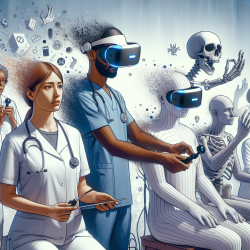Mental health disorders are a significant concern worldwide, affecting millions of individuals and presenting a substantial socioeconomic burden. Traditional treatments often include pharmacological and psychological interventions, but there remains a need for novel approaches that can enhance effectiveness and patient engagement. Virtual reality (VR)-based therapies have emerged as a promising avenue, offering unique advantages over conventional methods.
The Promise of VR-Based Interventions
VR-based interventions have shown potential in treating various psychiatric disorders, particularly anxiety-related conditions. By creating immersive environments, VR allows patients to confront and manage their fears in a controlled setting. This approach not only facilitates exposure therapy but also enhances the transfer of learning to real-world situations.
Key Findings from Recent Research
- Anxiety Disorders: VR has demonstrated medium-to-large effects in treating anxiety disorders when compared to inactive controls. However, it shows no significant difference compared to standard evidence-based approaches at post-treatment.
- Neurocognitive Disorders: Small positive effects on cognitive and emotional outcomes have been observed in patients with neurocognitive disorders using VR-based interventions.
- Social Skills Training: Insufficient data currently exists to classify VR as an evidence-based practice for social skills training in neurodevelopmental disorders.
Implementing VR-Based Therapies in Practice
As practitioners consider incorporating VR into their therapeutic repertoire, several factors should be taken into account:
- Personalization: Tailoring VR environments to individual patient needs can enhance engagement and treatment efficacy.
- Technological Advancements: Leveraging the latest VR technologies can improve immersion and the sense of presence, crucial for therapeutic success.
- Long-Term Effects: Preliminary data suggest that VR may offer more sustained benefits over time compared to traditional treatments.
Encouraging Further Research
The field of VR-based therapy is still evolving, with many areas ripe for exploration. Future research should focus on:
- Understanding Mediating Factors: Investigating patient characteristics and disorder severity that influence treatment outcomes.
- Developing Innovative Approaches: Creating new VR scenarios for complex and treatment-resistant symptoms.
- Conducting Robust Studies: Implementing well-designed randomized controlled trials with larger sample sizes to validate findings.
The integration of VR into mental health treatment represents a frontier with vast potential. By staying informed through ongoing research and collaboration with peers, practitioners can harness this technology to improve patient care significantly.
To read the original research paper, please follow this link: Evidence on Virtual Reality–Based Therapies for Psychiatric Disorders: Meta-Review of Meta-Analyses.










